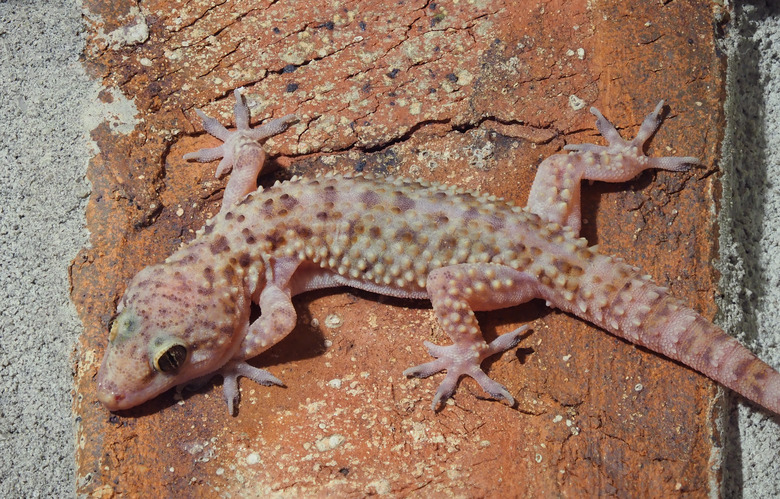Do Geckos Eat Bugs In The House?
We may receive a commission on purchases made from links.
One of the simple pleasures of visiting Hawaii or some other tropical or subtropical place is the sweet chirp of a gecko, so evocative of these lizards and locales. If you live in an area that supports geckos, you may see them clinging to a wall, ceiling, or window, waiting patiently for a morsel to stroll by because, yes, geckos eat bugs in a house.
What Kind of Gecko Is It?
What Kind of Gecko Is It?
The geckos you may see in a house are not those that are native to North America. Rather, they are most likely to be the Asian gecko, also known as the common house gecko (Hemidactylus frenatus), or its close relative, the Mediterranean gecko (Hemidactylus turcicus). Neither of these species has eyelids, unlike native species. Further, they have sticky toe pads and vertical pupils.
The Asian gecko has pink or almost transparent skin, while the Mediterranean species has brown and tan-flecked skin. Both have usurped some of the territory of native, urban-adapted geckos because they are so good at preying on insects, in particular those that are attracted to light. In fact, many states consider them an invasive species.
How Geckos Operate in a House
How Geckos Operate in a House
Those sticky toe pads provide house geckos with a seemingly uncanny ability to scale smooth surfaces, like tile or glass, or to just sit quietly on the ceiling. The Mediterranean gecko is considered entirely nocturnal, hiding in cracks and dark crevices during the day and then coming out only at night to hunt. The Asian gecko is mostly nocturnal but may sneak out on an overcast day not only for insects but also for human food — in particular, food with sugar.
Geckos easily enter a structure by scurrying under doors, through small windows or vent cracks, or around light fixtures. Once inside, they are pretty much guaranteed to flourish, given all the potential food and lack of predators. You might notice their eggs left inside a window crevice or another crack; these are about 1/4 inch in length and oval with an incubation period of about 46 to 62 days. Baby geckos become mature at about 6 months of age to a year. Geckos, in general, can live up to five years.
What Geckos Eat
What Geckos Eat
Geckos are skilled hunters, feasting on a range of insects, spiders, and other invertebrates. They may dine on fruit flies, house flies, beetles, ants, and mosquitoes. If they have the chance, they'll eat crickets, a food often given to geckos that are kept in homes as pets. Geckos also eat insect larvae, including wasp larvae.
Keeping Geckos Out
Keeping Geckos Out
If your idea of a cozy home is one without lizards, you can take steps to keep them out. The most obvious thing to do is to keep your doors and windows closed. In particular, people leave doors open while coming in and out or even for an entire afternoon in warm weather. If this is you, at least use a screen door. Make sure that each door has a door sweep to deter geckos from sneaking underneath. Addtional measures you can take include the following:
- Turn off the lights at night, as these lizards are particularly attracted to light, where they know they will find a meal.
- Apply caulk or add weatherstripping to any cracks or openings around your windows or vents.
- Take steps to control the insect population in your home since the presence of food is a primary gecko attractant. Seek professional pest control if you have an infestation of any kind.
If you already have geckos in your house and you'd like to remove them, don't poison them. Instead, catch them in live traps and then move them outside. Geckos are harmless to humans. If you notice them outside, just enjoy their presence, as they are doing you a favor by controlling pests.
